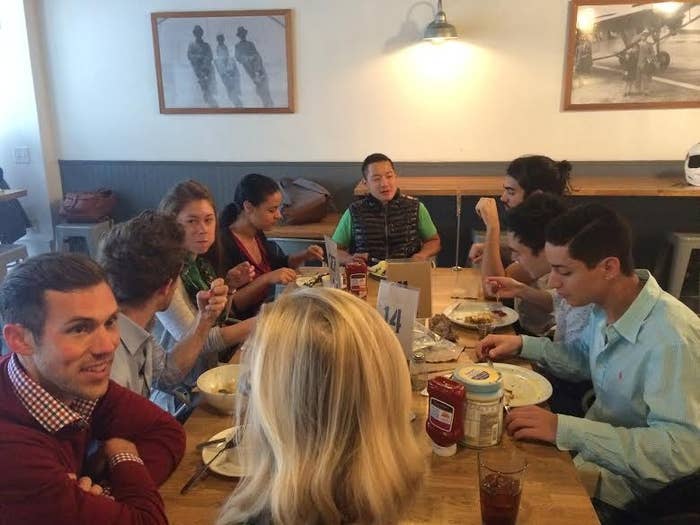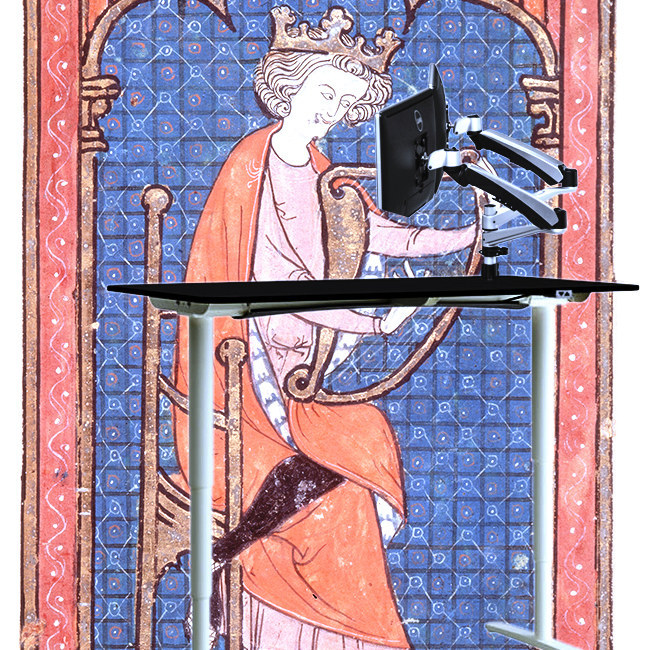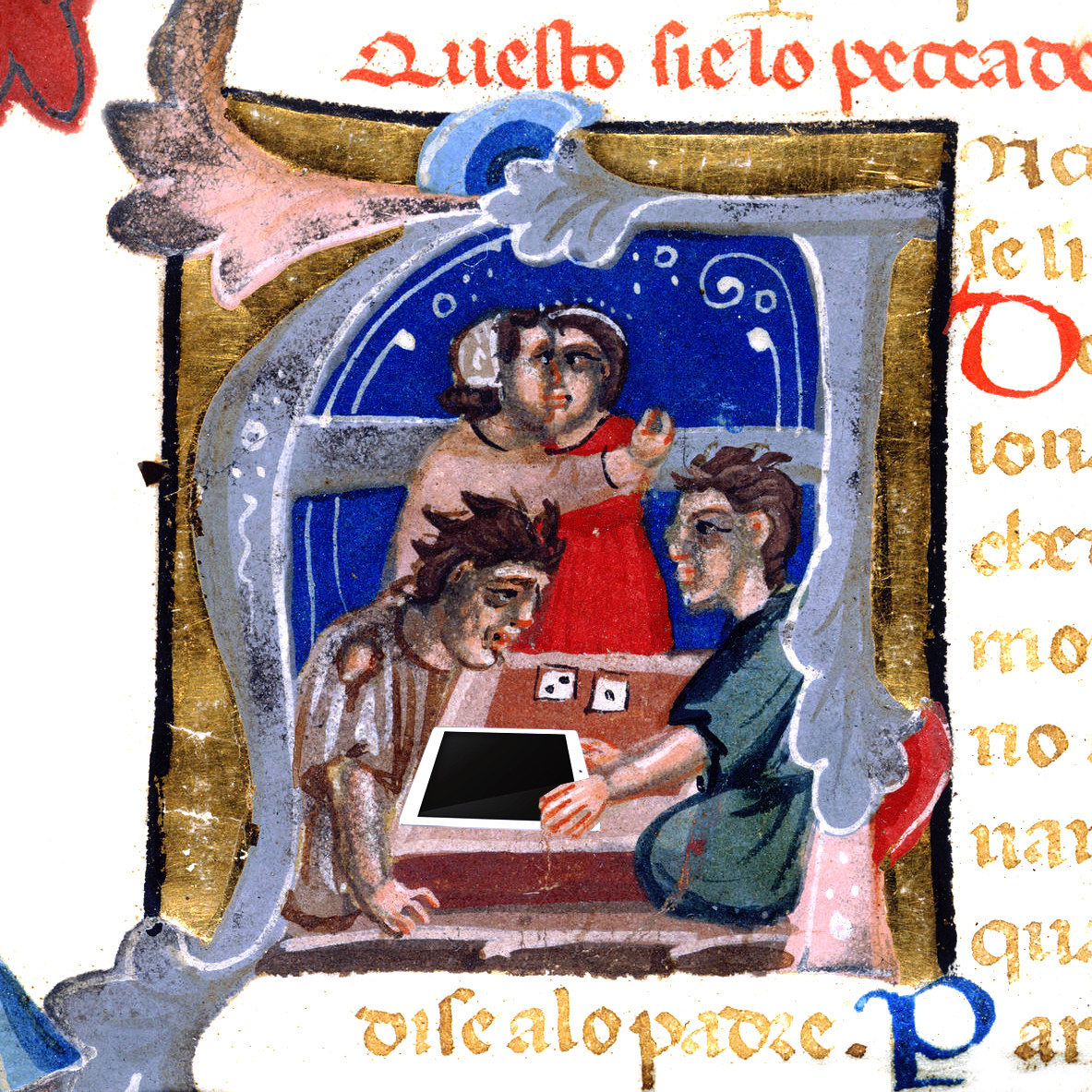
Every Wednesday at 8 a.m., members of a group called WeFa.st gather at a casual order-at-the-counter kind of San Francisco cafe for what they call a biohacker breakfast. The restaurant varies, but the meal is always awash with the relief of finally being able to eat.
WeFa.st is an online community made up mostly of tech workers, all of whom share a fascination with intermittent fasting, which dictates a strict schedule for fasting and eating in exchange for a host of health benefits. These mostly young, mostly male, hype men for biohacking have built an ethos around the diet, which promises peak productivity and readiness for a future where technology is king and the smartest man wins. If tech is becoming a lifestyle brand, then intermittent fasting is its Master Cleanse, and these are its Gwyneths. Each regimen has its own name, like the Warrior Diet, wherein the faster abstains for 20 hours and eats one big meal at night, or the Monk Fast, which entails fasting continuously for 36 hours. For the X Games of caloric consumption, there is the Himalayan Fast, where you fast continuously for 60 hours. “This is difficult to sustain,” the website warns.

Members of the WeFa.st breakfast club are on different regimens, but aim to end their fast in time for the group meal. Among intermittent fasters, the block of hours where you’re allowed to eat is called “a feeding window.” The term is better suited to farm animals or lab rats, but the vibe they’re going for is less mammal and more machine.
One of the biohackers at breakfast last week was Clinton Mielke, a data scientist working with MRI results from Alzheimer's patients at UCSF. Mielke also runs a startup called Infinome dedicated to increasing life expectancy. He predicts that the tech industry will shift away from software and toward personalized medicine, pointing to Google’s investments in life sciences startups like Calico and Verily, as well as its hiring of futurist Ray Kurzweil. According to Mielke, both he and the Google co-founders have had an epiphany: “The computer revolution was really exciting, but ultimately it’s the human source code that matters and that’s the human genome, the code that powers all of us.”
It’s a dizzying existential leap from skipping dinner to cheating death, but it also explains why some of the newer acolytes to a practice that dates back to ayurvedic medicine are approaching intermittent fasting with such zeal. Scientific research, mostly in mice, has shown that intermittent fasting can boost metabolism and fight diabetes and obesity; adherents are fond of mentioning studies about enhancing longevity.
It's also, according to Paul Benigeri, an engineer for the nootropics company Nootrobox, supposed to be a contrast to the status quo. “We're always splurging,” said Benigeri. “We eat a lot, we play a lot of games, we download a lot of apps.” Fasting offers a more austere alternative, he said. “You kind of feel like a monk.” (The Warrior Diet has been around for a couple years, but Benigeri said that he and his co-workers came up with “Himalayan” because it invoked a “super extreme” way of life.)
Indeed, perhaps there’s a reason that all three dietary archetypes seem to hark back to a time before standing desks, and why fasters tend to invoke evolutionary biology when explaining their choices. For years, a certain stratum of the tech industry has enjoyed unlimited access to venture-backed abundance. But if Salesforce managers are taking Benedictine vows and even Google is tidying its estate, we may be approaching an ascetic bent in the economic cycle.
Aside from the meetups, WeFa.st is basically just a group chat on Slack, the popular software for organizing teams and offices. Nootrobox, which sells mind-enhancing supplements, set it up after the company’s six-person, all-male staff challenged themselves to try it. WeFa.st isn’t the first online hangout for fasting obsessives, but it represents a new spin on the concept. You’re more likely to find hardcore disciples on bodybuilding sites like Leangains, but there, commenters are seeking “a shredded eight-pack,” explained Justin Schafer, a regular breakfast club member and former marketing analyst for Solar City, Elon Musk’s energy startup. The WeFa.st guys, said Schafer, are obsessed with “an optimally functioning human brain.”

Last week's breakfast was held at the Yerba Buena location of The Grove, a popular chain of homey cafes in San Francisco. The space earnestly adheres to the woodsy theme with actual floor-to-ceiling tree trunks amid the dining tables. At 8 a.m., the line to order already stretched from the counter to the door.
Because everyone is quasi-starving, biohacker etiquette permits digging in as soon as one’s food arrives. While some of us waited, Schafer passed around a box of Tulsi tea made with “holy basil” from India that supposedly makes the drinker impervious to stress, as well as a pop-top plastic bottle of L-theanine, a beginner-level nootropic that’s said to kill the jittery side effect of coffee.
I put the tea in my pocket and swallowed the pill with my coffee. If I had work to do after breakfast, Schafer assured me that I would now be good to go. All I had to do is put in some earbuds, go to Brain.fm (a site that uses artificial intelligence to recommend songs) and listen to some binaural beats, where different tones are played in each ear in order to enhance concentration. Geoff Woo, the Nootrobox CEO, nudged me. With a “belly full of food” I’d be ready for action, he said. (One big selling point for intermittent fasting is avoiding the food coma that plagues carb enthusiasts like myself.) Schafer, who was sitting across from me, made a tick-tock gesture with his index fingers to mimic the beats switching from ear to ear.
They grinned like they were going to induct me into a bungee-jumping club or hand me a micro-dose of LSD, not send me back to my office to sit on a chair and look at a screen. Once I returned to my desk, however, the combo did seem to do the trick. Schafer is a good salesman. A few days later I found myself in line at Whole Foods with two boxes of Tulsi tea and a strong suspicion that with a few tweaks, I might be able to master my own destiny.
During the three breakfasts I dropped in on, people were friendly and encouraging — intermittently cognizant of how they sound to the wider world, but also relishing in the subversiveness. (“I’m not a psychopath,” Schafer replied when I asked him if The Warrior Diet meant always saying no to after-work drinks or dinner with friends.) There’s a lot of talk about 23:1s or 16:8s, shorthand for the ratio of fasting hours to feeding hours. I watched a few try to out-reference each other with research papers like they were baseball stats. One biohacker, who identified himself only as Carl, told me that he’d “been reading shitloads of research” and described a week of plowing through 40 research papers on fasting — while simultaneously fasting. Carl said he got into discussions with academics about cell replication and cancer. “I not-so-gracefully shut them down,” he bragged. When I asked whether he was a programmer or a researcher, Carl didn’t specify, but he did volunteer that he was probably better read on the subject “than most people that are raised in academics.”

I decided to try a short fast after the first biohacker breakfast.
Practitioners recommend no more than 500 calories a day on fasting days. I didn’t intend to eat 94% of these allotted calories before 9 a.m., but it just sort of happened. I ate lentil soup (300 calories) and that made me want a slice of bread (140 calories) — and what kind of monster eats dry bread (70 calories of olive oil). By 3 p.m. on Tuesday I was scrolling through The Grove’s menu looking for the fattiest thing I could order. By 6 p.m. I was eating a soft-boiled egg (70 calories) to make it through the night. When I woke up the next morning, though, I felt excellent and ordered something (semi) healthy instead.
It supposedly gets easier. Benigeri told me that while abstaining, he and Gavin Banks, Nootrobox’s business development guy, have fantasized about In-N-Out and sent each other pictures of steak. But he also told me that talking about being hungry in the Slack group is rare because it implies weakness. The gnashing of teeth, he said, tends to happen one on one.
Banks was on the Himalayan Fast, so he wasn’t eating the morning of my second breakfast. Intermittent fasting, he said, helps him work better and faster. “I feel crispier and sharper throughout the day.” Crispier? “Crispier,” he said with a nod, making a gesture as if nerve endings were firing.
According to him, that’s the “motivating factor” that distinguishes fasting from diets. “The goal is to live forever, right?” Benigeri said to Banks, rapping his knuckle on the wooden table.
But it’s also apparently about the challenge. At the breakfast, the group joked about selling fasting kits containing air and water. Banks, who started fasting to lose his love handles, suggested “a mirror to look at yourself and not quit.”
“It’s another little mental victory over being lazy,” said Banks. (Not to mention one over temptation from the tech company cafeteria: “I'd get bored, have a snack,” Benigeri said. “I'd get angry, have a snack.”)
“Physical performance isn't necessarily representative of your salary,” Banks continued. Rather, salaries are “measured by how much you are output-ing at work.” (The number of nouns that these biohackers verb-ized during the course of one meal was arresting.) Fasting improves mental clarity so that he can do more work and generate more revenue. So instead of competing on a physical plane, “I am competing with the rest of the world.”
Schafer, who is 28 years old, said he quit his job recently to help out the family business and start up something of his own. In the meantime he’s driving a Lyft. I spoke to him just after he had dropped off a passenger. “People treat you differently when you’re in the service sector. It’s a little bit like a second-class citizen — and that’s totally fine. My identity is not tied to my current means of generating income. It’s more of a social experiment.”
I asked him if he’s concerned that the world will soon be divided into two categories: Uber drivers and Uber passengers. He said a dividing line was forming, but it would be between “the people who can wield technology and those who are the servants of technology. People who can master technology will be creating the systems,” like Uber, “and the others will be on the receiving end of it, I guess,” he said, referring to Uber’s plans to turn turn to driverless cars.
In Schafer’s mind, his lifestyle choices and the arc of technological development are aligned: “There are only going to be more distractions, more stimulations, and more opportunities to not focus on what matters.” So it will be increasingly important “to know how to focus and know how to prioritize in order to adapt to the present and the future.” He sounded like the mirror-image of a doomsday prepper: The apocalypse as told from the perspective of someone who expects to thrive in this harsh new reality.

There were two to five women at the three breakfasts I went to, better than the low bar set by your average tech conference, considering the size of the group. At the first meal, I met Mielke’s girlfriend, Jun Axup, who is also a startup founder and Ph.D. researcher. She’s been fasting for the past 12 years, but in a more organic manner. Axup doesn’t care for breakfast foods, so she fasts from 7 p.m. or 8 p.m. until noon the next day. It wasn’t until Mielke introduced her to intermittent fasting that she realized there was a name for it.
She described the gender imbalance in intermittent fasting as unfortunate, but expected — the same skewed ratio she’s had to face at work and school. (The research on how intermittent fasting effects women is not definitive. Some female fasters claim that it causes anxiety and irregular periods. A female founder at the breakfast club reported bloodshot eyes.) But Axup pointed out that it doesn’t reflect a lack of interest. “The fasting thing might be more male-dominated right now,” she said, but just look at all the YouTube videos about anti-ageing face creams or other makeup tutorials. “This whole search for a fountain of youth? Women have been doing this for a long time, too.”
Danielle Morrill is the CEO of Mattermark, a startup that collects and crunches data on private companies, which just raised more than $7 million in funding. Morrill began fasting inadvertently a couple months ago when she started getting up 5 a.m. and found the prospect of a sunrise meal unappealing. An investor in Bulletproof Coffee clued her in to the surrounding fervor. (Bulletproof’s founder, Dave Asprey, is partly responsible for the intermittent fasting fad.) Morrill hesitates to tweet or talk much about her diet, to avoid scrutiny and unnecessary competition. “I just want to figure out what is the ideal way to live day-to-day and I don’t think anyone really teaches you that.”

George Burke, another WeFa.st member, used to run a bitcoin startup and now organizes the San Francisco Peak Performance Meetup. Nearly 600 people are signed up for the meetups online, which is roughly 200 more members than WeFa.st. About 50 to 75 people have been showing up at events.
Burke had a unique perspective. He said he approached intermittent fasting not because he was a Type A guy who was always on his grind, but because he felt self-conscious about not being that guy. “I never really felt all that productive. My whole life I always felt like I was one step behind everyone else, so I was always looking for an edge.” Burke said that’s why he organizes the meetup, to share whatever he’s learned, but also to surround himself with experts. (It’s not too shabby for his personal brand in the fitness-tech space either.) “There are a lot of people who are underperformers and underachievers who simply accept their place in life, and I don’t,” he told BuzzFeed News. And now? A wrist full of self-tracking devices later? “People perceive me as being equal, so I’ll take it,” he said.
Schafer also traced his faith in fasting back to a sense of insecurity. In high school, he followed the whey protein and weightlifting wisdom popular in the '90s. It didn’t work. He would fall asleep during AP calculus every day because it came after lunch, and he lost the sense of himself as a curious, hyper-literate kid. That doesn’t seem to be an issue now. During the course of our 45-minute conversation, he mentioned Seth Godin, The Paleovedic Diet, Dave Asprey, Derek Sivers (who pioneered the decision tree: “Hell yeah!” or “No”), and Nassim Taleb’s Antifragile — a veritable office lounge shelf of counterintuitive thinking.
Burke’s approach to productivity makes him an ideal hypebeast for biohacking. His daily routine sounds like a word cloud for the quantified self. For example, Burke has also dabbled in micro-dosing LSD, another trendy productivity hack that posits that micrograms of hallucinogens can be office appropriate. During his bitcoin days, he said he wasn’t scared to lead a meeting while microdosing because “they are mostly libertarians and many of them enjoy their vices. I’ve never been to wilder parties, outside of the bitcoin space."
As with all health fads, there’s still a lot of conflicting advice about fasting and micro-dosing, but that uncertainty doesn’t faze Burke. “I’ll experiment with almost anybody’s advice. That’s kind of what biohackers do,” he explained.
Burke’s quest to reach the apex of performance has some hardware components as well. He wears an Apple Watch to measure his heart rate and an Atlas wristband to measure reps at the gym. He also uses a Pavlok, a device that zaps users with a bit of electricity, as a means of curing bad habits.
So far, he’s found it useful for both fasting and quitting vaping. He recommended a new Chrome plugin that punishes you for opening too many windows. “Set it at 10 or more browser tabs, it’s going to zap you.” Burke said the sensation was kind of like touching a doorknob charged with static electricity. “It’s uncomfortable but it’s not painful. They even make sex toys with little type of zap, so you’re not going to die,” he assured me.
Burke had to miss the biohacker breakfast, but when he broke his fast later that day it was with food from Two Forks, a meal delivery service. His options that day included grass-fed beef with roasted plantains and green beans and shallot salad, as well as free-range chicken with roasted eggplant and kale salad. Even though it’s made for Paleo, Burke still has to tweak it to his standards. “I have to modify [the deliveries] because there are still starches in these meals that I’m not going to eat.”
